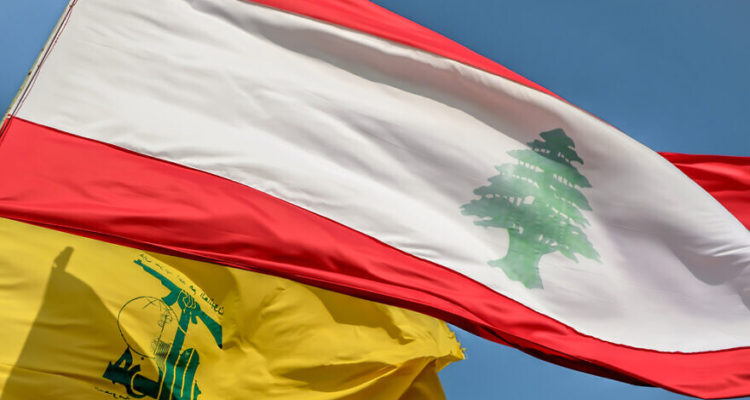Are Hezbollah and Lebanon one and the same? It depends who you ask.
By David Isaac, JNS
Israel and Lebanon appear closer to resolving their maritime border dispute, with potentially lucrative gas deposits at stake, if Hezbollah doesn’t derail the negotiations. At least, that is the widely held belief. However, not all subscribe to it, with some analysts disputing whether the distinction drawn between Hezbollah and Lebanon is an artificial one.
Tony Badran, research fellow at the Washington, D.C.-based Foundation for Defense of Democracies (FDD), argues Hezbollah and Lebanon are one and the same.
“Hezbollah isn’t undermining the negotiations, it’s conducting them,” he told JNS, noting that Hezbollah’s recent demand that talks wrap up in mid-September is meant to push negotiations along by creating the semblance of a crisis.
Reports suggest U.S. mediator Amos Hochstein is using the mid-September deadline to pressure the Israelis to make concessions, he said. “Hochstein has been leveraging this threat, judging from the leaks and from what the Israelis have been saying, telling them that if they don’t get this done by September, there’s a risk of conflict because Hezbollah is going to target the rigs.”
For the United States, the negotiations have always been about helping Lebanon, which has been in economic decline. This was the case when negotiations started under the Obama administration about 10 years ago, continued when former Secretary of State Mike Pompeo revived them in 2020 and follows the same line today under the Biden administration, according to Badran.
“They will use all these lovely sounding words about supporting the Lebanese people, but they are pushing for investments in a Hezbollah-controlled economy, in a Hezbollah-controlled country, with a Hezbollah-controlled government while negotiating with Hezbollah front men,” said Badran.
Nabih Berri, the speaker of the Lebanese parliament and a Shi’ite ally of Hezbollah, has been a key negotiator in talks, he noted. “More recently, Hochstein has been negotiating with another Shia, called Abbas Ibrahim, who is a brigadier general and runs the General Security Directorate,” he said.
“Now, you might ask, why is the General Security Directorate involved in anything having to do with a maritime border dispute? Well, because he’s a Hezbollah ally.”
Daniel Pipes, president of the Middle East Forum, told JNS that the situation is more nuanced.
“I don’t think you can simply say that the Lebanese state and Hezbollah are the same,” he said.
The Lebanese government has concerns separate from Hezbollah, he said. It’s eager to resolve the maritime crisis with Israel and to start drilling given its bankrupt financial condition. The offshore gas deposits are “the only source of money on the horizon,” according to Pipes.
Hezbollah, on the other hand, “is primarily concerned with its patrons in Tehran.”
Even then, he said there are tensions within Hezbollah between factions who are more focused on the local population vs. others who want to abide by Iran’s will.
Badran, however, insisted that the United States and Israel are maintaining a “fiction” in order to be able to negotiate with Lebanon. “It’s the same issue with people who say Hezbollah has a military wing versus a political one. It’s the exact same category, for the same function.”
According to Badran, this “fiction” has security consequences for Israel. He noted that Israeli security officials had advised at one cabinet meeting suspending the maritime talks “because it was not a good idea to negotiate under threat of violence.”
“Creating a false distinction erodes Israel’s deterrence posture and its ability to conduct war against Hezbollah in the future,” he said. Hezbollah’s hostile posture toward Israel hasn’t changed and its coffers will fill thanks to the expected windfall from natural gas.
What’s more, Israel undermines its own position, which stipulates that if attacked by Hezbollah from Lebanese territory it will treat Lebanon as the one responsible, said Badran.
Pipes sees those two positions as applying to different circumstances. “I don’t see that agreeing to the American plan is a capitulation to Hezbollah,” he said. “The Israelis have spoken very harshly about what would happen if there are attacks on gas installations. Israeli deterrence has often been declared defunct, but the Israelis are formidable. The Lebanese know that,” he added.
“I think, from the Israeli point of view, having neighbors that are not desperate is a good thing, or putting it another way, desperate neighbors are not good neighbors,” he said. “Some money will go to Hezbollah. It’s inevitable. But I’m weighing that against a desperate population that could take desperate steps.”
Badran expressed worry that Israel was heading for trouble by building policy around false assumptions, whether out of the incorrect belief that Hezbollah had been pushed back in the last elections (something he said was simply not correct), or out of the need of some Israelis to demonstrate “they bear no ill will towards the people of Lebanon.”
In a perfect world, Israel and the United States would not be holding the talks at all, he said. Hezbollah leader Hassan Nasrallah hasn’t just threatened Israeli gas rigs in disputed waters but in what are clearly Israeli waters, he said. “That is something Israel cannot accept, and it should not, in my opinion, be negotiating at all, and certainly not under these conditions.”





